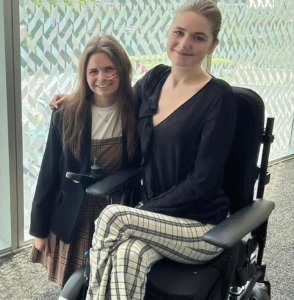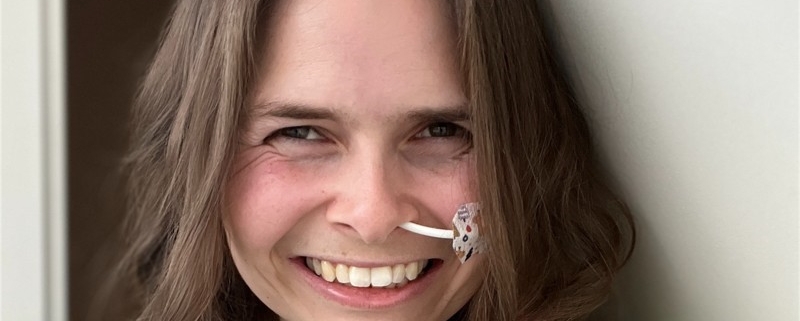Lauren Dewhirst: volunteering is her life blood
For Youth Week Aotearoa, Alice Mander interviewed young volunteers to learn about their work, motivations, and observations about volunteering in up and coming generations. In this story, Lauren and Alice discuss their experiences as young disabled volunteers.
“As much as I love just sort of sitting back and watching the world around me, I think I’m someone who just really likes actually doing. I just want to be an active member of society, playing my part, and be able to give back to the people who have given me so much,” Lauren remarks, as she sits at her desk at Otago University where she has recently taken on the role of student advisor at the Disability Information and Support office.
In the many years I have known and worked with Lauren, I can count the number of times on one hand that I’ve seen her sit back and simply watch the world around her. Our friendship is one of the many highlights of my own volunteering journey. We met as disabled tertiary students, volunteering our time to advocate for our community of disabled students in the tertiary education system.

Lauren and Alice
In 2022, we became co-Presidents of the National Disabled Students’ Association, a predominantly volunteer organisation I established with the help of incredible advocates like Lauren two years prior. Together, we tackled individual universities and polytechs, worked with government departments and political parties, and helped build a national movement of disabled student advocates. To her new role, Lauren has brought her experience as leader and founder of the Otago Disabled Students’ Association, as well as her years of volunteer work with organisations like Hato Hone St John, GirlGuiding NZ, Scouts Aotearoa, and an ongoing eight year stint with the Otago University Students’ Association student welfare programme, Are You OK? As she says, “For me, personally, I reflect back on Lauren a few years ago, Lauren five years ago, Lauren ten years ago, volunteering has always been my life blood.”
Cared for or carer?
At the heart of the disability rights movement is the belief that we aren’t disabled by our impairments, but by systemic barriers and attitudes which position disabled people as lesser citizens. The terms ‘volunteer’ and ‘charity’ may therefore be fraught for the disabled community, who are often positioned as mere recipients of care, as opposed to being strong individuals with a vast array of skills we can bring to the table.
For Lauren, this definitely rings true: “I definitely have had to be careful what roles I put myself into because attitudes of some people can be hurtful, and it can be challenging if someone brings their own experiences or beliefs into a situation, but are misinformed, or haven’t spoken to me first. It’s like, ‘Oh no you can’t do that’, but have you asked if I can do that? Or did you discuss that with me first?’”.
For young volunteers with a disability, attitudes can make or break the continuation of a volunteering journey. As Lauren explains, having a supportive team and environment which accepts and encourages her makes her want to work that little bit harder, reinforcing her mindset that, “I can do anything, or that I can do what I want to do”.
Research into young disabled people’s experiences of volunteering is clear: disabled people who volunteer are more likely to have higher self esteem, and have a greater sense of wellbeing. However, while this evidence is valuable, little is often said about the benefits that the volunteering world receives from people like Lauren, and indeed myself. While Lauren would be slow to admit it – as a self confessed “humble kiwi”- her existence as not only a volunteer, but a disabled volunteer is invaluable.
Having worked within the disability space and community for years now, I’ve come to recognise a beautiful characteristic of disability culture: our delineation between ‘cared for’ and ‘carer’, is frequently blurred. Not only does this welcome and encourage vulnerability, but it allows us to explore and recognise our own limitations. For Lauren, this means knowing that she can’t pour from an empty cup, ensuring she is well enough and safe before she helps others. She also thinks that this has encouraged others to start volunteering their own time. “It’s been nice to be able to help prove that you can do anything,” she says.
Disabled people know how quickly you can go from being a volunteer, to being the person receiving help. Lauren tells a humorous story of being a first aid volunteer at a music festival, in which one of the security guards fainted from the heat. “Ironically,” she laughs, “he ended up in our tent sitting next to all the drunk people. Things like that can happen to anybody.” For disabled people we already know this; giving and receiving care is second nature.
Passion and identity
Perhaps this is why both I and Lauren don’t completely relate to the term “volunteer”. My main motivation for doing unpaid work – which has typically been in the advocacy and campaigning space – is out of a passion and drive to address systemic barriers facing disabled people. As a disabled person myself, to not do this work would feel wrong, somehow in conflict with my politicised identity as a disabled person. Lauren’s the same: “What makes me happy is being able to give back, being able to share my experiences, my knowledge, being able to make a difference, even being able to meet people, being involved in different conversations and decisions.” For people like Lauren, giving her time for organisations and causes she believes in is simply part of who she is. “It’s funny, the word ‘volunteer’… it’s like the word disabled! I wouldn’t necessarily walk around and say ‘Hi I’m Lauren and I’m disabled’ or ‘Hi I’m Lauren and I’m a volunteer’, but I’m both of those things! And it’s just part of who I am, I’m just being me and living my life and doing what I enjoy and what I want to do.”
When asked what Lauren would say to people who think young people are disengaged with our communities, she had a succinct answer: “I would say that they need to look harder”.



